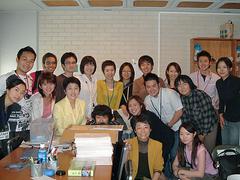 On the seventh of May, 2004, CGS held a lecture titled "Marriage, Family and Gender" in commemoration of its opening. The lecturer was Fukushima Mizuho, who worked for the cases of sexual harassment and domestic violence as a lawyer. Now she vigorously wrestles with the passing of the registration that allows married women to have the choice of keeping their own maiden names. She also exert and effort for abolishing the discrimination for love children. "as my hobby, reasons for life and practical benefits, I will act out", being a member of the House of Councilors and the Social Democratic Party head, Ms. Fukushima clams.
On the seventh of May, 2004, CGS held a lecture titled "Marriage, Family and Gender" in commemoration of its opening. The lecturer was Fukushima Mizuho, who worked for the cases of sexual harassment and domestic violence as a lawyer. Now she vigorously wrestles with the passing of the registration that allows married women to have the choice of keeping their own maiden names. She also exert and effort for abolishing the discrimination for love children. "as my hobby, reasons for life and practical benefits, I will act out", being a member of the House of Councilors and the Social Democratic Party head, Ms. Fukushima clams.
In the lecture, Ms. Fukushima mainly focused on women's issues in which she made steady efforts for. She mentioned how these efforts changed the awareness of gender in Japanese society over many generations. Above all, she emphasized the" importance of the society in which people appreciates diversified range of the way to live".
This lecture made me ponder the society she stated. The appreciation of diversity has surely been amid calls for quite a long time. However, the society seems to be abundantly difficult to achieve, and thus there seems to be many assignments which are to be considered.
Let's take "marriage" for one example. First of all, alternative ways to live should be advanced for the appreciation of diversity, getting married, not getting married or others to the people in the society. Secondly, no particular way to live should vicariously prerogative among these diversities, in other words, no particular "natural" way to live should be stated. This is to avoid breeding the exclusive social structure in which one way to live is commonly recognized as "normal ", and the others as "abnormal".
When getting to the core of it, however, legal marriage or the "natural" form of marriage per se can be questioned, because it is to encourage people to get married by providing the label that it is "legally guaranteed" way to live, no matter how many alternative ways of living are offered without having peculiar privileges.
Most shockingly of all things, I realized that it is no one but myself who perpetuate this "natural" form of living. When confronted someone like Ms. Fukushima who does not adopt the "natural" and choose other ways to live, I discover latent prejudice or discrimination inside me that I had taken the certain way of living for granted, excluding others. Recognizing that I was the one who had prejudiced perception toward these diversities astonishes me, and paralyzing sense of helplessness strikes my mind. These new discoveries awake me to open my eyes to alternative ways of living, which I have never thought of. It also makes me think about the way I am living and the way I will live hereafter.
Through the lecture by Ms. Fukushima, I realized that facing the image of the "natural" way to live reveals perception which takes up residence inside of me. And therefore, discovering the prejudice can be the very first step for me to contribute to the appreciation of diversified range of the way to live in the society as one constituent member of the community.
(ICU Student : Kaneko, Ikumi)